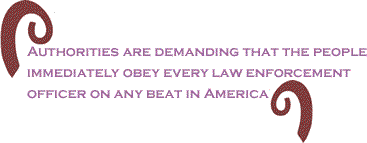A
restive general, police armed with the latest technology
in “non-lethal” force, and grid locked government have been
joined by an FBI that seems to have morphed into the thought
police, all firing the shot across the bow of those who
seek to exercise their constitutional rights and the Bill
of Rights.
The
news of last week’s FBI raids of the homes of anti-war activists
in Minneapolis and Chicago
spread across the country like a wildfire.

In
the raids, FBI agents, armed with warrants, entered the
homes of the activists and left with boxes filled with personal
belongings: computers, cell phones, photographs, papers,
various publications, and many other items.
People
whose homes were violated were served with summonses to
appear before a grand jury and they were instructed to bring
with them a list of items, presumably those things the agents
could not snatch in the raid. The targeted men and women
rightly called the raids a “fishing expedition” and said
they had done nothing to warrant such an intrusion into
their private lives.
For
its part, the FBI’s official statement on the raids was
that there were no arrests expected at this time and that
the agency was simply investigating any individuals or groups
that might have been in contact with, or supportive of,
groups that have been identified by the U.S. government
as terrorists. It is well known how easy it is to be placed
on a terror list and it’s well known what a nightmare one
has to endure in getting off any such list.
Possibly,
though, the most ominous statement to come out of the raids
was the FBI’s assertion to the general public that there
is “no imminent danger” posed by the violated Americans.
This, of course, implies that these people could - or would
- pose a danger at some time in the future.
But
what the raided citizens have been doing for years is what
millions of Americans have done:  Worked
to uphold human rights everywhere, for equality and justice,
for peace and against war - and they have contacted groups
and individuals who work toward the same ends in other countries. Worked
to uphold human rights everywhere, for equality and justice,
for peace and against war - and they have contacted groups
and individuals who work toward the same ends in other countries.
Many,
if not the vast majority of them, have pacifist leanings
or strong anti-war beliefs (or both) and would not look
with favor on support for groups that advocate or engage
in violence. So, why the raids on these citizens?
The
short answer seems to be that an anti-war movement that
is growing will interfere with the machinations of empire
and, possibly, bring an end to endless war. The raids are
a warning to Americans who actively work to end the wars:
You could be the next one to have your life disrupted and
your possessions confiscated, as well as your personal records
examined, copied, and perused by strangers. You could be
the next one charged as an “enemy combatant,” if someone
in government chooses to call you one.
And,
just this week, the Associated Press reported that the Obama
Administration is seeking to make it easier to conduct Internet
surveillance. That is, authorities want to more easily peruse
Internet records, including your personal e-mails, whether
on a computer or on a hand-held communications device. The
list goes on.
Recent
occurrences involving military brass contribute to the unease
that citizens feel about the direction of their country.
President Obama had to fire General Stanley McChrystal,
commander in Afghanistan, because of derogatory opinions about
the competence of the administration in matters of war.
Although General McChrystal apologized, acknowledging that
under our form of government, civilian leaders give the
orders to the military. Obama replaced him with General
David Petraeus, in charge of what is now America’s
longest war.

Traditionally,
moving up in the military is easier in wartime and, lately,
the U.S. has given officers plenty of opportunity
to advance in rank, because there are so many wars from
which to choose. There are hundreds of U.S.
bases around the world each of which must have its complement
of troops. A reduction in the number of bases reduces the
opportunity to serve and rise to a higher rank, especially
if the base is in a place where there are hostilities. Therefore,
any sensible second lieutenant is going to do whatever possible
to see that all of those bases survive and the war opportunities
continue to grow.
Some
of the hostilities are, of course, for oil, some war is
for other natural resources, and some of it is to make the
world safe for low-wage factory sites or cash crops to pay
for the national debt. There are many reasons for the U.S. to stand astride the world, among them the
need simply to “express power.” The pesky citizenry opposed
to extending the empire will be studiously ignored or neutralized,
through programs like last week’s legalized home invasions.
It
remains to be seen whether there was any reason whatsoever
for the FBI to raid homes in Minnesota and Illinois, but
it’s a good possibility that we won’t hear much about it
after the initial flurry of public relations. There are
some who will be convinced by last week’s raids not to become
involved in very public demonstrations against the war or
U.S. foreign policy.
On the other hand, such an attempt as the raids to douse
the fervor of anti-war activists may just steel their resolve
and the movement might grow and become more unified.  For
example, there were demonstrations this week around the
country to protest last week’s raids. For
example, there were demonstrations this week around the
country to protest last week’s raids.
\The
Bush-Cheney Administration, to curb the impulse of the people
to express themselves as provided by the First Amendment
(to petition their government), invented “free speech pens,”
which were chain-link fence enclosures set up away from
the government officials, so said officials never had to
hear or even see the protesters.
There
was an attitude promulgated by George W. Bush that, “if
you’re not with us, you’re with the terrorists.” That kind
of public attitude is what has set the stage for the kind
of fishing expedition we saw last week and are likely to
see more of in coming months.
It
isn’t just the FBI that is ramping up threats against people
who dissent from official policy or just fail to obey. With
the hysteria that was generated by the previous administration
about terrorism, it’s not surprising that authorities are
demanding that the people immediately obey every law enforcement
officer on any beat in America.
A video of a mother being tasered by a cop outside her vehicle
while her children watched from inside was listed on the
Internet as one of many examples of abuse of so-called non-lethal
weapons available to police and others…except they can,
and have, killed innocent people.
America has experienced other times when dissent was especially
vilified by the establishment, even criminalized. But this
time, it’s different. Never has there been a time when there
were technology and systems in place that allowed such complete
intrusion into the lives of the people. As far as we know,
they have not figured out a way to read the minds of the
people, although someone must be working on it.

Until
then, they can send FBI agents on fishing expeditions into
private homes (remember that our homes used to be our “castles”)
to see if they can determine what people are thinking by
analyzing their letters, their papers, the publications
they read, and the e-mails that arrive via computer every
day.
If
you oppose endless war, if you oppose the extension of the
American Empire to the ends of the earth using the most
powerful military the world has ever seen, if you want to
see an end to the poverty, ignorance, and ill health that
is all around us (caused by the bankrupting of our social
programs by unlimited and growing military spending), you
probably will have to make a decision soon.
The
decision will be whether to take a stand against policies
that are eating away the substance of our stated constitutional
principles, publicly and consistently, or you will have
to live “under the radar,” hoping to get along, without
making waves, in a world that someone else creates for you.
BlackCommentator.com
Columnist, John Funiciello, is a labor organizer and former
union organizer. His union work started when he became a
local president of The Newspaper Guild in the early 1970s.
He was a reporter for 14 years for newspapers in New York State. In
addition to labor work, he is organizing family farmers
as they struggle to stay on the land under enormous pressure
from factory food producers and land developers. Click here
to contact Mr. Funiciello. |

